"You were the future once…" A fresh-faced David Cameron stung Tony Blair, then British prime minister, with the barb shortly after being elected leader of the Conservative Party in 2005.
Fourteen years on, Cameron is history, but as with Blair, his legacy haunts British public life. Both are best remembered for big decisions that backfired on them. Both are among the most unpopular politicians in the country.
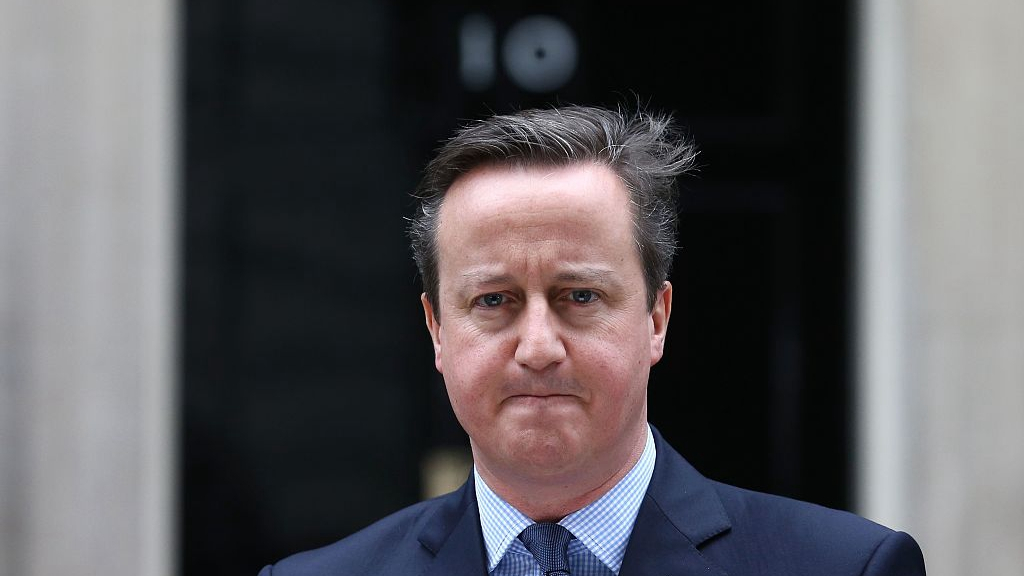
David Cameron makes a statement outside 10 Downing Street in London, February 20, 2016. /VCG Photo
David Cameron makes a statement outside 10 Downing Street in London, February 20, 2016. /VCG Photo
Cameron has now emerged from media exile to promote his autobiography, For The Record, published on Thursday. A book tour will follow, during which the man who called the Brexit referendum, lost it and then resigned, will be peppered with questions about his responsibility for the current chaos in British politics – autograph events are unlikely to be love-ins.
The former prime minister is the latest in a library of ex-leaders to put pen to paper. Some memoirs are scandalous, others are revealing, many are dull. The most interesting are often from those who didn't quite make it. But what motivates top politicians to turn writer when their career ends?
In my own words…
"I consider that it will be found much better by all parties to leave the past to history, especially as I propose to write that history."
Wartime prime minister Winston Churchill's quote captures the goal of many political memoirs.
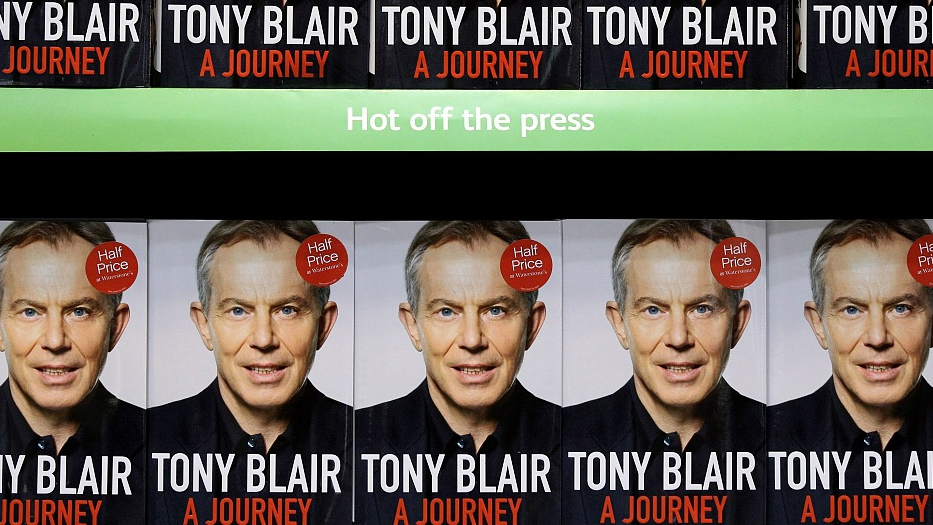
The memoir of former British prime minister Tony Blair, entitled 'A Journey', goes on sale in London, September 1, 2010. /VCG Photo
The memoir of former British prime minister Tony Blair, entitled 'A Journey', goes on sale in London, September 1, 2010. /VCG Photo
No politician of stature will go through a career without upsetting people. A former leader might feel his or her achievements have been forgotten, or decisions misinterpreted. For those who fear being defined by one big negative, trying to claw back the legacy they believe they deserve is high on the agenda.
"For 3 years I have kept relatively quiet about politics," Cameron tweeted on Saturday. "But I think it's right former PMs write their memoirs, to explain what they did and why."

Cameron was once respected if not loved. Now he is the most disliked politician in Britain, according to YouGov polling, with a 61 percent disapproval rate. Three years ago, shortly after he left office, that number was 34 percent.
His promotional interviews have suggested the book may be self-critical as well as an attempt to justify his decision to call the Brexit referendum. The problem, as former U.S. president Ronald Reagan noted in The Reagan Diaries, is that in politics "if you're explaining you're losing."
Settling scores…
Loyalty is prized in politics, but ambition often wins out and betrayal tends to follow. How better for a former leader to extract revenge – and boost sales – than by settling scores in a memoir?
In his memoir, excerpts of which have been published in the British press, Cameron lashes out at Boris Johnson, his schoolmate, university contemporary, sometime friend and rival, and now prime minister, but reserves his bitterest comments for former close ally Michael Gove, who he felt betrayed him on Brexit.
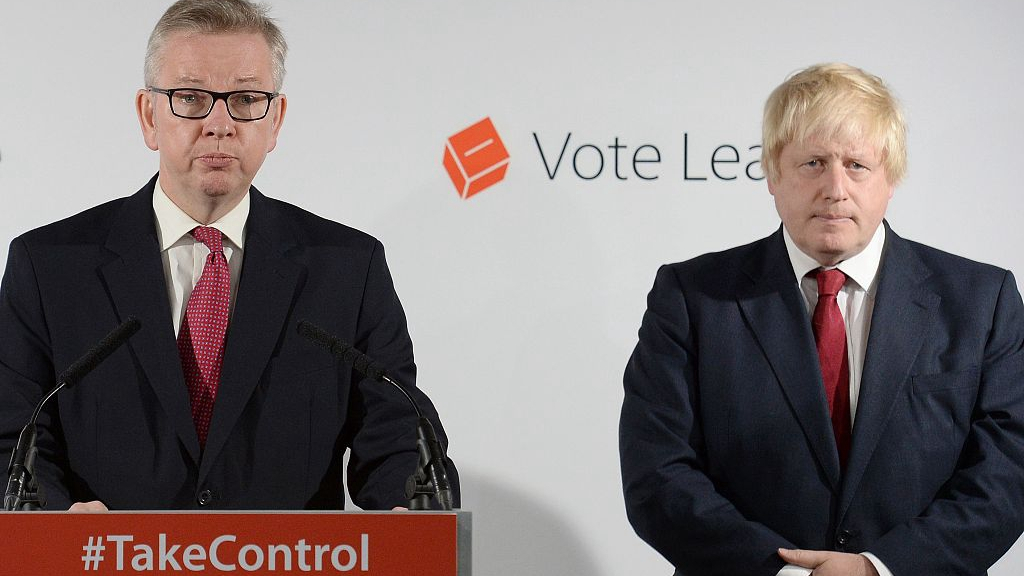
Vote Leave leaders Michael Gove and Boris Johnson during a press conference in London, June 24, 2016. /VCG Photo
Vote Leave leaders Michael Gove and Boris Johnson during a press conference in London, June 24, 2016. /VCG Photo
Both men "behaved appallingly" and "left the truth at home," according to Cameron. Johnson "risked an outcome he didn't believe in because it would help his political career," while Gove was "an ambassador for the truth-twisting age of populism." He doesn't hold back on other Brexit-backing Conservatives either, hitting former leader Iain Duncan Smith as an "outdated old clunker."
The revenge memoir is not limited to leaders – spouses, partners and staffers have got their own back in writing too.
A tell-all book by journalist and former French first lady Valérie Trierweiler in 2014, in which she accused her partner, then president Francois Hollande, of snobbishness and indecision, damaged his chances of reelection.
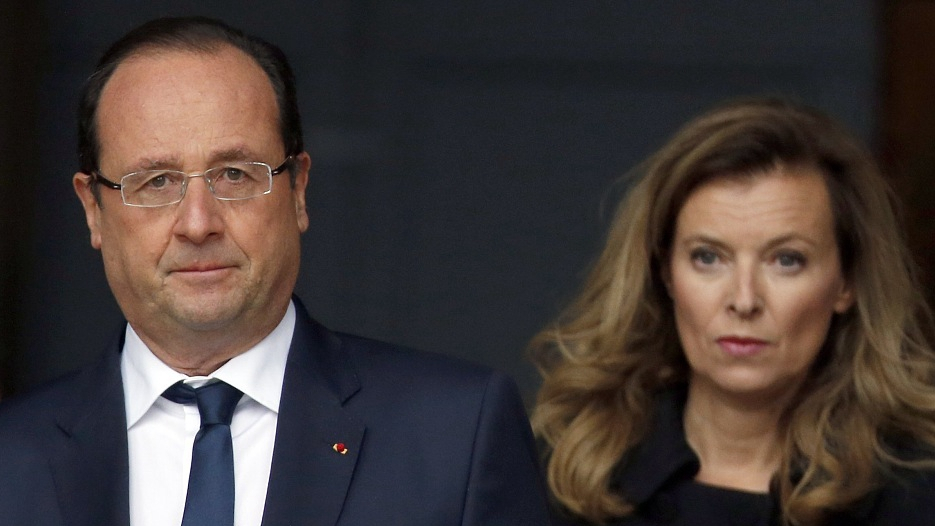
Francois Hollande, then French president, and his companion Valérie Trierweiler in Paris, October 16, 2013. /VCG Photo
Francois Hollande, then French president, and his companion Valérie Trierweiler in Paris, October 16, 2013. /VCG Photo
A big cheque…
Presidents and prime ministers are typically paid well but not extravagantly. When their political career ends, money-making opportunities – speeches, board jobs and book deals – emerge.
Cameron sold the rights to his 752-page book to HarperCollins for a reported 800,000 British pounds back in 2016. Unfortunately for the publishers, his popularity has slumped as Brexit has become ever more messy. Bookstores in some Remain-backing areas are refusing to stock the book.
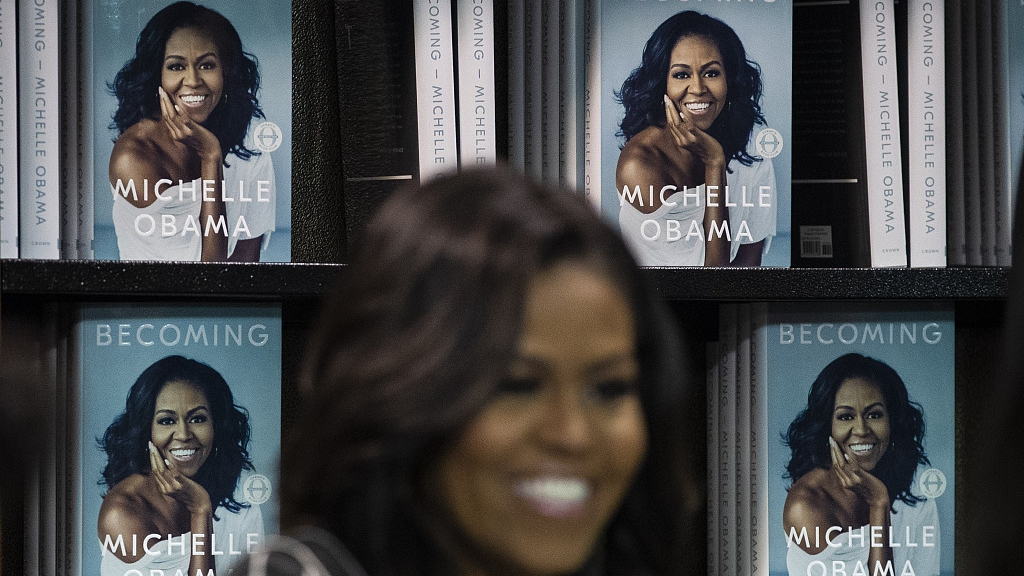
Michelle Obama signs copies of her new book 'Becoming' in New York, November 30, 2018. /VCG Photo
Michelle Obama signs copies of her new book 'Becoming' in New York, November 30, 2018. /VCG Photo
Blair attracted a healthy 4.6 million-pound advance for his memoir, A Journey. Former U.S. president Bill Clinton received a reported 15 million U.S. dollars for My Time in 2004, and Hillary Clinton was paid 11.5 million U.S. dollars for Hard Choices.
Barack and Michelle Obama signed a joint deal reportedly worth in excess of 65 million U.S. dollars in 2017. The former first lady's Becoming has already sold over 10 million copies, and the previous president's highly-anticipated book is expected to hit shelves in 2020.
Ego…
Humility is a word rarely associated with politicians: a certain level of narcissism is probably a necessary quality for a person who takes decisions on behalf of millions of people.
Hollande, who was usurped by his protégé Emmanuel Macron in the 2017 election, insisted while promoting his memoir Lessons of Power: "I could have beaten Emmanuel Macron, but I didn't want to."
Departed leaders go from the trappings of power and the media spotlight to yesterday's news overnight, and reviving a little of the glow from the glory days is tempting.
A politician who has dropped from sight but fully intends to return sometimes publishes a biography too, particularly in the talk show-heavy U.S., where a book can secure a booking.
Campaign in prose?
Memoirs aren't limited to former politicians. French presidential candidates "publish or perish", according to The Economist.
They're also a staple of any presidential race in the United States – an exception to the old maxim "campaign in poetry, govern in prose."
Scan the Amazon shelves to discover rows of books from the 2020 contenders: The Truths We Hold (Kamala Harris), An Unlikely Journey (Julian Castro), Shortest Way Home (Pete Buttigieg), United (Cory Booker), Promise Me, Dad (Joe Biden) to name but five.
And the publication of a memoir in an election cycle is often a smoke signal. So what to make of leading Republican Trump critic John Kasich's upcoming book and former UN ambassador Nikki Haley's With All Due Respect, scheduled for a November release?